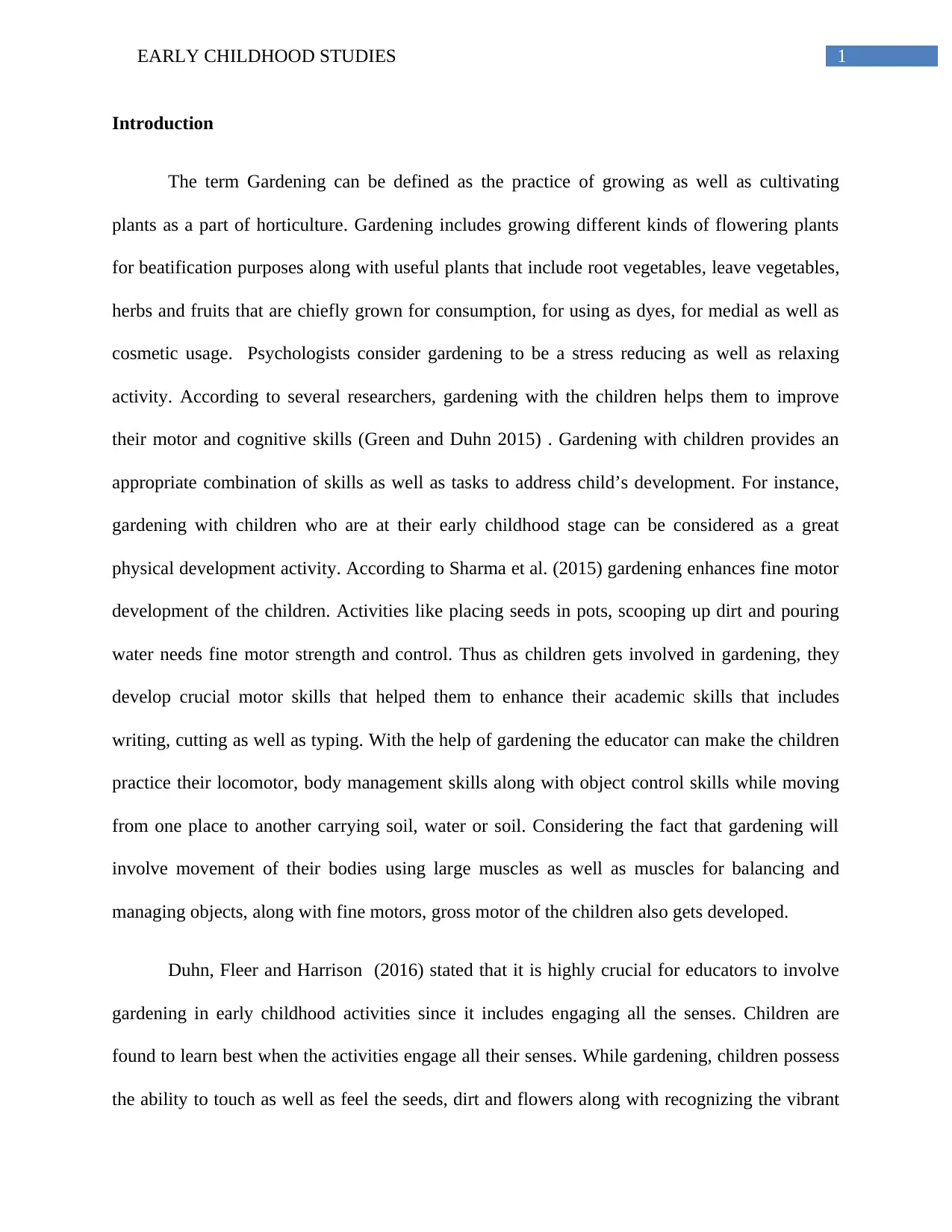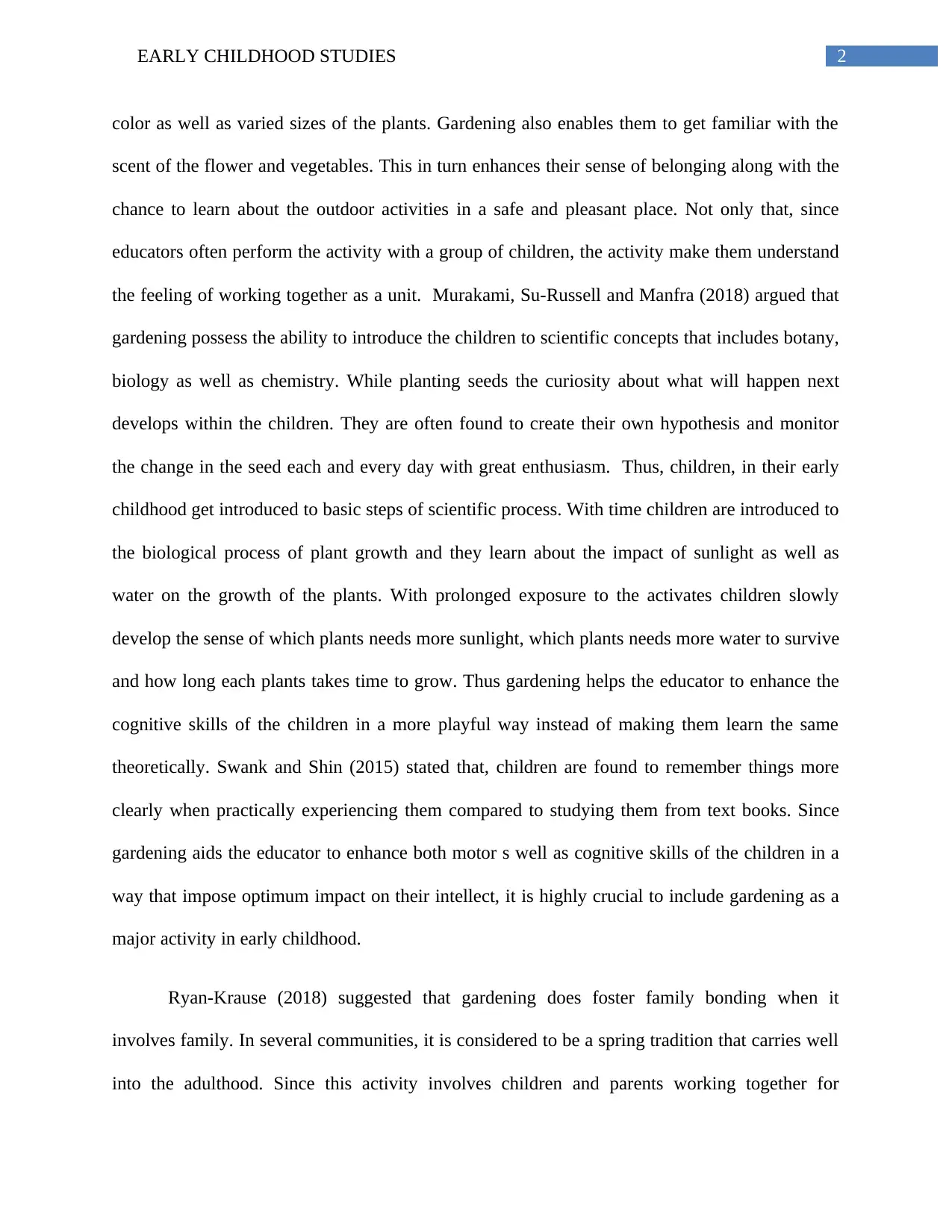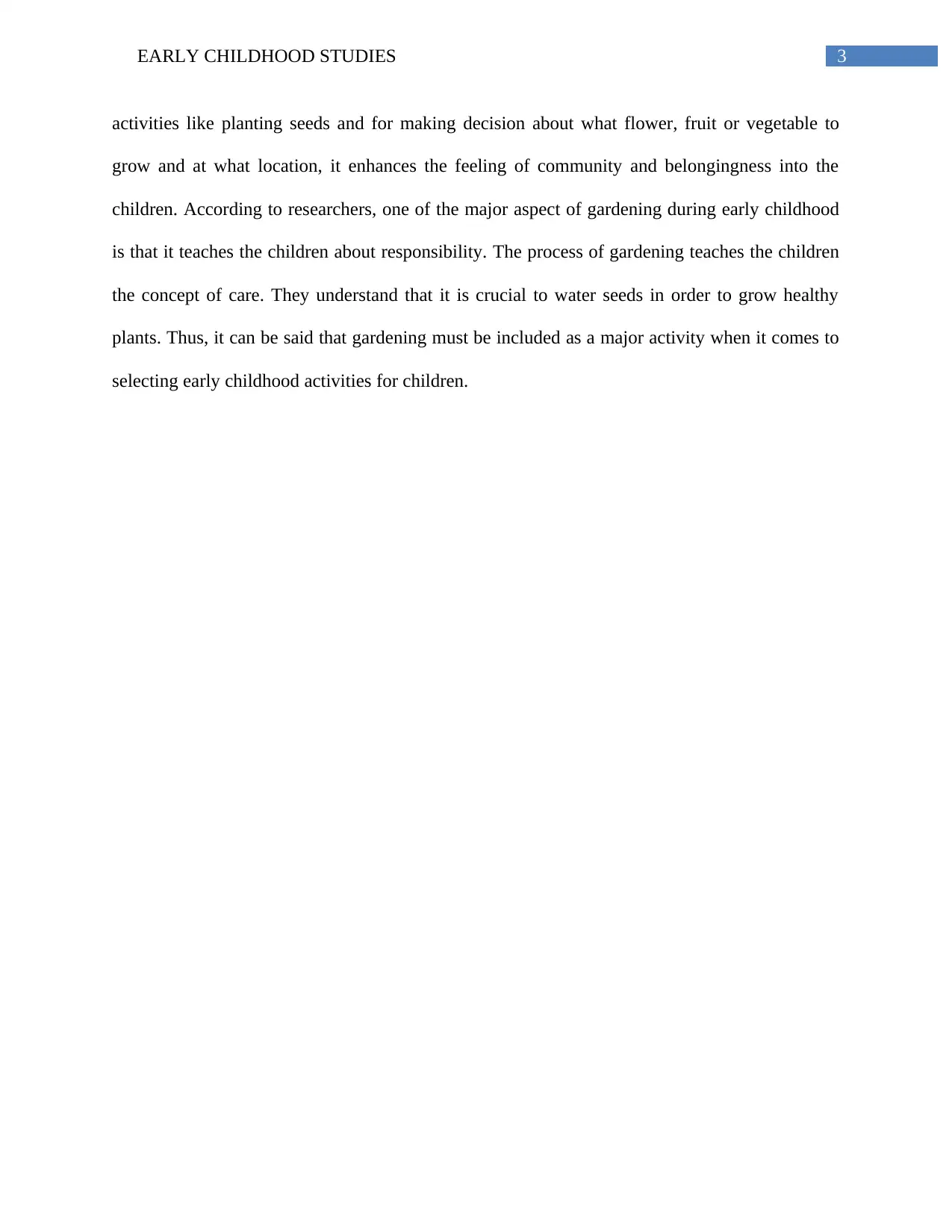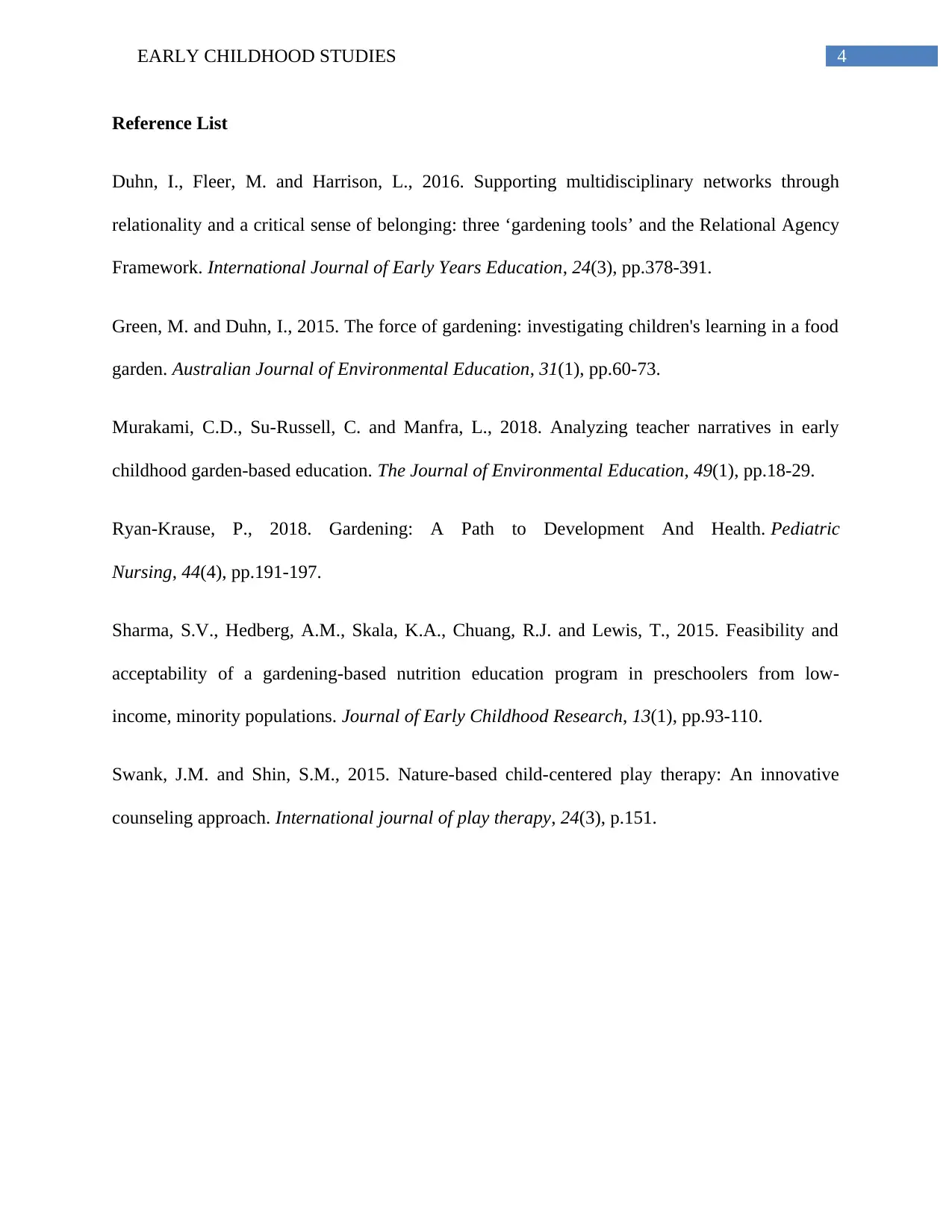Early Childhood Studies: The Role of Gardening in Child Development
VerifiedAdded on 2023/04/21
|5
|1125
|410
Essay
AI Summary
This essay explores the benefits of gardening in early childhood education, emphasizing its role in enhancing motor and cognitive skills. It highlights how gardening activities, such as planting seeds and watering plants, improve fine and gross motor skills, contributing to academic abilities like writing and cutting. Furthermore, gardening engages all the senses, fostering a sense of belonging and providing opportunities to learn about outdoor activities in a safe environment. The essay also discusses how gardening introduces children to scientific concepts like botany, biology, and chemistry, encouraging curiosity and hypothesis formation. It underscores that practical experiences, like gardening, aid memory and learning more effectively than theoretical study. The essay concludes that gardening fosters responsibility and community bonding, making it a crucial activity for early childhood development.

Running head: EARLY CHILDHOOD STUDIES
Early Childhood Studies
Name of the Student
Name of the University
Author Note
Early Childhood Studies
Name of the Student
Name of the University
Author Note
Paraphrase This Document
Need a fresh take? Get an instant paraphrase of this document with our AI Paraphraser

1EARLY CHILDHOOD STUDIES
Introduction
The term Gardening can be defined as the practice of growing as well as cultivating
plants as a part of horticulture. Gardening includes growing different kinds of flowering plants
for beatification purposes along with useful plants that include root vegetables, leave vegetables,
herbs and fruits that are chiefly grown for consumption, for using as dyes, for medial as well as
cosmetic usage. Psychologists consider gardening to be a stress reducing as well as relaxing
activity. According to several researchers, gardening with the children helps them to improve
their motor and cognitive skills (Green and Duhn 2015) . Gardening with children provides an
appropriate combination of skills as well as tasks to address child’s development. For instance,
gardening with children who are at their early childhood stage can be considered as a great
physical development activity. According to Sharma et al. (2015) gardening enhances fine motor
development of the children. Activities like placing seeds in pots, scooping up dirt and pouring
water needs fine motor strength and control. Thus as children gets involved in gardening, they
develop crucial motor skills that helped them to enhance their academic skills that includes
writing, cutting as well as typing. With the help of gardening the educator can make the children
practice their locomotor, body management skills along with object control skills while moving
from one place to another carrying soil, water or soil. Considering the fact that gardening will
involve movement of their bodies using large muscles as well as muscles for balancing and
managing objects, along with fine motors, gross motor of the children also gets developed.
Duhn, Fleer and Harrison (2016) stated that it is highly crucial for educators to involve
gardening in early childhood activities since it includes engaging all the senses. Children are
found to learn best when the activities engage all their senses. While gardening, children possess
the ability to touch as well as feel the seeds, dirt and flowers along with recognizing the vibrant
Introduction
The term Gardening can be defined as the practice of growing as well as cultivating
plants as a part of horticulture. Gardening includes growing different kinds of flowering plants
for beatification purposes along with useful plants that include root vegetables, leave vegetables,
herbs and fruits that are chiefly grown for consumption, for using as dyes, for medial as well as
cosmetic usage. Psychologists consider gardening to be a stress reducing as well as relaxing
activity. According to several researchers, gardening with the children helps them to improve
their motor and cognitive skills (Green and Duhn 2015) . Gardening with children provides an
appropriate combination of skills as well as tasks to address child’s development. For instance,
gardening with children who are at their early childhood stage can be considered as a great
physical development activity. According to Sharma et al. (2015) gardening enhances fine motor
development of the children. Activities like placing seeds in pots, scooping up dirt and pouring
water needs fine motor strength and control. Thus as children gets involved in gardening, they
develop crucial motor skills that helped them to enhance their academic skills that includes
writing, cutting as well as typing. With the help of gardening the educator can make the children
practice their locomotor, body management skills along with object control skills while moving
from one place to another carrying soil, water or soil. Considering the fact that gardening will
involve movement of their bodies using large muscles as well as muscles for balancing and
managing objects, along with fine motors, gross motor of the children also gets developed.
Duhn, Fleer and Harrison (2016) stated that it is highly crucial for educators to involve
gardening in early childhood activities since it includes engaging all the senses. Children are
found to learn best when the activities engage all their senses. While gardening, children possess
the ability to touch as well as feel the seeds, dirt and flowers along with recognizing the vibrant

2EARLY CHILDHOOD STUDIES
color as well as varied sizes of the plants. Gardening also enables them to get familiar with the
scent of the flower and vegetables. This in turn enhances their sense of belonging along with the
chance to learn about the outdoor activities in a safe and pleasant place. Not only that, since
educators often perform the activity with a group of children, the activity make them understand
the feeling of working together as a unit. Murakami, Su-Russell and Manfra (2018) argued that
gardening possess the ability to introduce the children to scientific concepts that includes botany,
biology as well as chemistry. While planting seeds the curiosity about what will happen next
develops within the children. They are often found to create their own hypothesis and monitor
the change in the seed each and every day with great enthusiasm. Thus, children, in their early
childhood get introduced to basic steps of scientific process. With time children are introduced to
the biological process of plant growth and they learn about the impact of sunlight as well as
water on the growth of the plants. With prolonged exposure to the activates children slowly
develop the sense of which plants needs more sunlight, which plants needs more water to survive
and how long each plants takes time to grow. Thus gardening helps the educator to enhance the
cognitive skills of the children in a more playful way instead of making them learn the same
theoretically. Swank and Shin (2015) stated that, children are found to remember things more
clearly when practically experiencing them compared to studying them from text books. Since
gardening aids the educator to enhance both motor s well as cognitive skills of the children in a
way that impose optimum impact on their intellect, it is highly crucial to include gardening as a
major activity in early childhood.
Ryan-Krause (2018) suggested that gardening does foster family bonding when it
involves family. In several communities, it is considered to be a spring tradition that carries well
into the adulthood. Since this activity involves children and parents working together for
color as well as varied sizes of the plants. Gardening also enables them to get familiar with the
scent of the flower and vegetables. This in turn enhances their sense of belonging along with the
chance to learn about the outdoor activities in a safe and pleasant place. Not only that, since
educators often perform the activity with a group of children, the activity make them understand
the feeling of working together as a unit. Murakami, Su-Russell and Manfra (2018) argued that
gardening possess the ability to introduce the children to scientific concepts that includes botany,
biology as well as chemistry. While planting seeds the curiosity about what will happen next
develops within the children. They are often found to create their own hypothesis and monitor
the change in the seed each and every day with great enthusiasm. Thus, children, in their early
childhood get introduced to basic steps of scientific process. With time children are introduced to
the biological process of plant growth and they learn about the impact of sunlight as well as
water on the growth of the plants. With prolonged exposure to the activates children slowly
develop the sense of which plants needs more sunlight, which plants needs more water to survive
and how long each plants takes time to grow. Thus gardening helps the educator to enhance the
cognitive skills of the children in a more playful way instead of making them learn the same
theoretically. Swank and Shin (2015) stated that, children are found to remember things more
clearly when practically experiencing them compared to studying them from text books. Since
gardening aids the educator to enhance both motor s well as cognitive skills of the children in a
way that impose optimum impact on their intellect, it is highly crucial to include gardening as a
major activity in early childhood.
Ryan-Krause (2018) suggested that gardening does foster family bonding when it
involves family. In several communities, it is considered to be a spring tradition that carries well
into the adulthood. Since this activity involves children and parents working together for
⊘ This is a preview!⊘
Do you want full access?
Subscribe today to unlock all pages.

Trusted by 1+ million students worldwide

3EARLY CHILDHOOD STUDIES
activities like planting seeds and for making decision about what flower, fruit or vegetable to
grow and at what location, it enhances the feeling of community and belongingness into the
children. According to researchers, one of the major aspect of gardening during early childhood
is that it teaches the children about responsibility. The process of gardening teaches the children
the concept of care. They understand that it is crucial to water seeds in order to grow healthy
plants. Thus, it can be said that gardening must be included as a major activity when it comes to
selecting early childhood activities for children.
activities like planting seeds and for making decision about what flower, fruit or vegetable to
grow and at what location, it enhances the feeling of community and belongingness into the
children. According to researchers, one of the major aspect of gardening during early childhood
is that it teaches the children about responsibility. The process of gardening teaches the children
the concept of care. They understand that it is crucial to water seeds in order to grow healthy
plants. Thus, it can be said that gardening must be included as a major activity when it comes to
selecting early childhood activities for children.
Paraphrase This Document
Need a fresh take? Get an instant paraphrase of this document with our AI Paraphraser

4EARLY CHILDHOOD STUDIES
Reference List
Duhn, I., Fleer, M. and Harrison, L., 2016. Supporting multidisciplinary networks through
relationality and a critical sense of belonging: three ‘gardening tools’ and the Relational Agency
Framework. International Journal of Early Years Education, 24(3), pp.378-391.
Green, M. and Duhn, I., 2015. The force of gardening: investigating children's learning in a food
garden. Australian Journal of Environmental Education, 31(1), pp.60-73.
Murakami, C.D., Su-Russell, C. and Manfra, L., 2018. Analyzing teacher narratives in early
childhood garden-based education. The Journal of Environmental Education, 49(1), pp.18-29.
Ryan-Krause, P., 2018. Gardening: A Path to Development And Health. Pediatric
Nursing, 44(4), pp.191-197.
Sharma, S.V., Hedberg, A.M., Skala, K.A., Chuang, R.J. and Lewis, T., 2015. Feasibility and
acceptability of a gardening-based nutrition education program in preschoolers from low-
income, minority populations. Journal of Early Childhood Research, 13(1), pp.93-110.
Swank, J.M. and Shin, S.M., 2015. Nature-based child-centered play therapy: An innovative
counseling approach. International journal of play therapy, 24(3), p.151.
Reference List
Duhn, I., Fleer, M. and Harrison, L., 2016. Supporting multidisciplinary networks through
relationality and a critical sense of belonging: three ‘gardening tools’ and the Relational Agency
Framework. International Journal of Early Years Education, 24(3), pp.378-391.
Green, M. and Duhn, I., 2015. The force of gardening: investigating children's learning in a food
garden. Australian Journal of Environmental Education, 31(1), pp.60-73.
Murakami, C.D., Su-Russell, C. and Manfra, L., 2018. Analyzing teacher narratives in early
childhood garden-based education. The Journal of Environmental Education, 49(1), pp.18-29.
Ryan-Krause, P., 2018. Gardening: A Path to Development And Health. Pediatric
Nursing, 44(4), pp.191-197.
Sharma, S.V., Hedberg, A.M., Skala, K.A., Chuang, R.J. and Lewis, T., 2015. Feasibility and
acceptability of a gardening-based nutrition education program in preschoolers from low-
income, minority populations. Journal of Early Childhood Research, 13(1), pp.93-110.
Swank, J.M. and Shin, S.M., 2015. Nature-based child-centered play therapy: An innovative
counseling approach. International journal of play therapy, 24(3), p.151.
1 out of 5
Related Documents
Your All-in-One AI-Powered Toolkit for Academic Success.
+13062052269
info@desklib.com
Available 24*7 on WhatsApp / Email
![[object Object]](/_next/static/media/star-bottom.7253800d.svg)
Unlock your academic potential
Copyright © 2020–2026 A2Z Services. All Rights Reserved. Developed and managed by ZUCOL.





